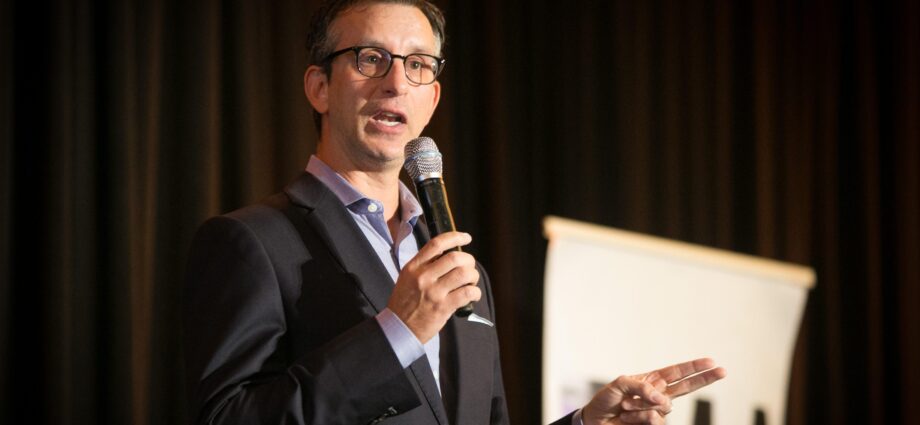While it is technically an annual conference for a trade organization, the National Music Publishers’ Association’s membership meeting has become more like a TV network’s upfront presentation: a major show in the music business with performances from top artists, strong visuals, updates on policies and ongoing battles, and fiery speeches primarily from the organization’s president-CEO of 20 years, David Israelite.
This year’s meeting had stellar acoustic performances and moving speeches from honorees Kacey Musgraves and Gracie Abrams as well as Thomas Rhett, a tribute song to Musgraves from Leon Bridges, and lots of data about the ongoing battle for songwriters’ rights — and payment — in the streaming age.
Popular on Variety
But many people remarked that something missing from this year’s awards was fireworks from Israelite, who often announces NMPA lawsuits against a streaming platform or a hot new tech startup that NMPA feels is not paying proper royalties for the music — lawsuits they usually win.
However, the fireworks were there — just more carefully and tactfully worded.
Toward the end of his speech, which included slams at Spotify and Amazon Music for their “bundling” packages that have enabled them to pay hundreds of millions of dollars less to songwriters, Israelite address the plight of what is often termed the “non-performing songwriter,” which is more accurately songwriters who are not major recording artists as well. In the vinyl and CD era, a non-performing songwriter could do well, because the percentage of the price of an $18 CD that their song earned was often substantial. Needless to say, in the streaming age, that same percentage of $.003 per stream is infinitesimal.
An artist doesn’t have to worry as much about that because they can derive income from touring, merch, recorded-music royalties and more, because they’re an artist who people will pay to see and hear. Despite that power imbalance, artists often use their leverage against non-performing songwriters to get more credit and income than they may actually deserve — this syndrome was extensively examined by Variety in the 2021 article, “Inside the Dirty Business of Hit Songwriting.”
It’s not an easy topic to broach, because most songwriters need any income they can get, and they and most people in the business are reluctant to call out artists, who of course are the lifeblood of the business.
But at this year’s meeting on Wednesday, Israelite went there, without naming names. The segment of his speech appears in lightly edited form below.
“We have a unique problem that plagues the songwriting industry: Songwriters don’t stick together.
This is a tough conversation, because it requires us to change the way we do things. It requires resolve for the greater good of the industry.
Those who are fighting for fair songwriter rates are sometimes attacked by some of the very songwriters they are trying to help. And that’s because some of those songwriters are also recording artists who view these platforms through a different lens, and this dynamic can cause us to crumble from within.
Compare the music industry with the film and TV industry. When film and TV screenwriters went on strike, the impact on famous actors was similar to the impact on famous artists when songwriters go on strike.
But instead of those actors objecting because it would delay the release of a movie, or make a television show go dark, the actors stood behind the screenwriters. And the strength of saying “no” led to a fairer price for the intellectual property created by those film and TV writers.
We can build the same strength. But we need artists and their teams to appreciate that without a healthy songwriter economy, the entire system suffers. So, I am calling on recording artists, managers, and record labels to stand with non-performing songwriters whenever and wherever they strike.
With half of the industry’s income based in public performance, performing rights organizations also have a crucial role in ensuring songwriters are paid fairly.
So when GMR stands up to the bullies of big radio, we all should stand behind them.
When SESAC fights for better rates from Google, one of the largest companies in the history of the planet, we should all stand behind them.
And while ASCAP and BMI don’t have the power to say “NO” under their consent decrees, when they go to rate court to fight for better rates from broadcast radio, or satellite radio, or live music venues, we should all stand behind them.
As we continue the fight to get more of your rights in a free market. Don’t forget your rights that are already there. There is an opportunity to make a meaningful difference in songwriter income — if we stand together.
And we all need to do a better job articulating why we are in these disputes, so that songwriters are armed with the information they need to help themselves.
Always remember: nothing exists in a vacuum. The rates achieved where we are in a free market have a ripple effect on those rates under government control.
We fought hard to include an improved rate standard in the Copyright Royalty Board so that all open market deals will now be considered as evidence for what your songs are worth.
There has never been a greater need to stand up for the value of your songs.
Fortunately, there are some superstar artists who already get this.
They have always seen themselves as songwriters first. They never lose that identity or the courage to stand up for the pure songwriting community.
We are celebrating one of those artists tonight… Kacey Musgraves.

